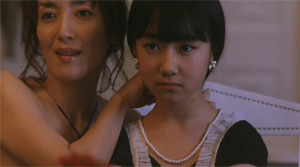

Kimyō na sākasu
Japan 2005
Genre:
Drama
Director:
Sion Sono
Cast:
Masumi Miyazaki
Rie Kuwana
Hiroshi Ohguchi
Issei Ishida
Mai Takahashi
Fujiko
Tomorowo Taguchi
Madame Regine
Erika Mine
Keiko Yokomachi
Tsutomu Ihara
Emiko Yamada
Sachiko Yamagishi
Ken Sasaki

Strange Circus
Story: The little girl Mitsuko (Rie Kuwana) is forced by her father Gozo (Hiroshi Ohguchi) to watch him and her mother Sayuri (Masumi
Miyazaki) having sex. Eventually, Gozo frequently rapes his daughter. Not only doesn't her mother help her, she even becomes envious and abuses her child,
when her husband isn't at home. One day an accident happens in which Mitsuko's mother dies. The girl now believes to have died in the place of her mother
and from that day on lives together with Gozo as Sayuri. But she can't completely shut her eyes from reality and so she attempts suicide. As a result she
ends up in a wheelchair.
Female writer Taeko (Masumi Miyazaki) is very successful with her books and currently works on a story around the little girl Mitsuko. Yuji (Issei Ishida)
is assigned to her by the publishing company as a helping hand in everyday matters since Taeko is wheelchair-bound. Yuji is a big fan of the writer, but
is now instructed by the publishers to find out whether her books are autobiographical or not...
Review: It is no exaggeration to call "Strange Circus" a movie-turned nightmare. Even in the plot summary several taboo subjects come to
light that become a surreal net of drama, pain and art on the screen. It's in fact as if you were in a delirium and had to face your most deep-seated
fears. Here things don't revolve around the horror of a monster or brutal killer but the fragile psyche is put into the foreground instead. The depths
that open up before us are filled with huge amounts of madness, philosophical brain work and intoxicating pictures. "Strange Circus" isn't easy for the
viewer to grasp, but it is worth the effort.

The story of Mitsuko produces an odd kind of sadness that makes you somewhat depressive, which is pretty similar to the inner emptiness of the girl.
The little girl that is abused soon shows pathological symptoms. She changes places with her mother, which provides Sion Sono, who implements a lot of
sex scenes into his movie, with smart means to show the gruesome acts of the father in an indirect manner. Mitsuko on the other hand often flees into
a burlesque circus in which you can come across other freaks as well. That her experience makes her a devastated individual is to be expected. And the
circus serves her as a safe haven where she can find peace, but at the same time there are also other interpretations applicable. The entangled story demands
the use of quite some grey matter anyway.

As was the case with Sion's "Suicide Club" there is also an extreme turn to be found at the end of "Strange Circus". Mitsuko's
childhood serves as some kind of introduction while the actual movie seemingly just starts with the writer. But even after that we constantly return to the
childhood thanks to the use of flashbacks. The twist at the end catches you off-guard and in an instant the director deconstructs his whole film, which is
the icing on the cake of the surreal nature of this work and at first leaves you behind bewildered. Thanks to elaborate explanations - here the
director even goes a few steps to far, making that part rather tedious - the viewer has enough time, while the movie progresses, to piece the puzzle
together. However, that doesn't mean that everyone will end up having the same picture in hand.
Later on Sion Sono contrasts the world of the author with reality and we have to ask ourselves, who Taeko actually is. Mitsuko? If so why is she able to walk?
The countless symptoms that the mentally ill individuals carry around with them and the way the director sketches them convincingly in his very own surreal
manner are almost frightening. "That's totally sick!", is something you will think on numerous occasions. Mitsuko being put into a cello case has to watch
her parents during intercourse, later on the father is having orgies at home while his daughter is apathetically rolling from room to room, Taeko writes
her stories in a secret room, in which she can live out her hoarding syndrome, and while doing so talks to a cello case. Or is there maybe even someone inside
it?!

In contrast to "Noriko's Dinner Table" for example Sion Sono is now also putting more emphasis on the visuals. The colors are at times pretty lavish, the pictures are in general strong and so the surreal aspect of the movie shows to advantage pretty well. Aside from the numerous sex scenes there are also some bloody pictures. "Strange Circus" is no (s)exploitation-flick, but rather some sort of art. During one scene, in which apparently a real op is shown, you might get sick, nonetheless. But what's even worse than such pictures is the world that the director creates here. Life is drawn in such sick colors that you wish for nothing more than salvation. You may get it in the end, but it demands a lot of strength on your part to get there.

Disclaimer

















